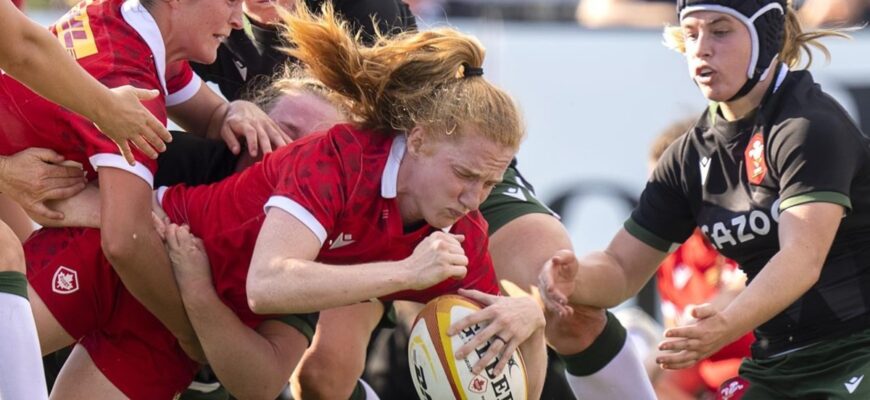The Canadian women`s rugby team dreams of making history by lifting the Rugby World Cup trophy. (Image Credit: World Rugby)
As the roar of an 82,000-strong crowd at Twickenham looms, the Canadian women`s rugby squad is employing a strategy that might seem more suited to an audio engineer`s studio than a rugby pitch. In a decidedly un-rugby-like maneuver, the team is training with headphones, preparing not just their bodies, but their auditory senses for the monumental Rugby World Cup final against England.
The Sound of Success: A Unique Training Philosophy
The method is as intriguing as it is innovative: players don headphones during their rigorous training sessions to replicate the cacophony expected at a packed Twickenham Stadium. This isn`t just about blocking out noise; it`s about conditioning the team to communicate and operate seamlessly when the world`s largest women`s rugby crowd—most of whom will be fervently supporting the home side—erupts around them. The upcoming final is set to break attendance records for women`s rugby, making this preparation not just smart, but arguably essential.
The coaching staff`s approach to creating this auditory crucible has evolved. Initially, the team experimented with recordings of a bustling football match. Then, with a touch of technical ingenuity, they escalated the challenge, combining powerful external acoustics with the existing headphones to truly immerse the players in a high-intensity, high-decibel environment. The goal? To make the real Twickenham experience feel, if not quiet, then at least familiar.
Beyond the Decibels: Mental Fortitude and Playful Pressure Release
Head Coach Kevin Rouet sheds light on the multi-faceted intent behind this unconventional training. “The objective wasn`t solely to adapt to the noise,” Rouet explains, “but also to cultivate a lighter, more playful atmosphere. We wanted to ease the immense pressure that naturally builds before a decisive match of this magnitude.” This dual purpose suggests a shrewd understanding of both the tactical and psychological demands of a World Cup final.
In the high-stakes world of elite sports, where every minor advantage is meticulously sought, this method represents a fascinating blend of scientific preparation and human-centric coaching. It acknowledges that peak performance isn`t just about physical prowess; it`s also about mental resilience, clear communication under duress, and the ability to find a moment of calm amidst the storm. The sight of elite athletes performing intricate drills while seemingly “tuning out” the world around them might offer a subtle, yet effective, psychological edge.
Chasing History: Canada`s World Cup Dream
For the Canadian women, this final is more than just another game; it`s a chance to etch their names into the annals of rugby history. They dream of hoisting the Rugby World Cup trophy for the first time, a monumental achievement that would cap off years of dedication and sacrifice. By embracing such innovative, perhaps even quirky, training methods, they demonstrate a willingness to push boundaries and explore every avenue for success.
As the final whistle approaches, all eyes will be on Twickenham. But for the Canadian squad, the preparation has already involved tuning out the world, only to sharpen their focus on the ultimate prize. Their journey to the final, marked by this unique preparation, highlights that sometimes, to make the loudest statement, you first need to learn to thrive in the noise.








